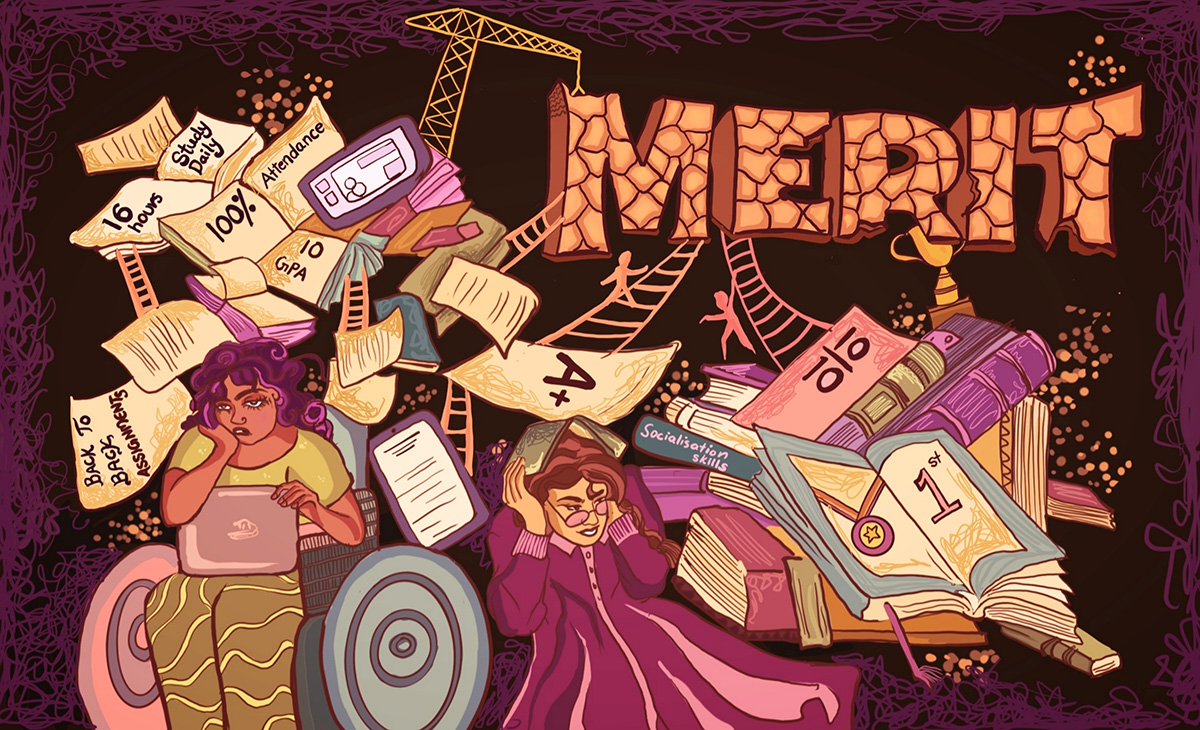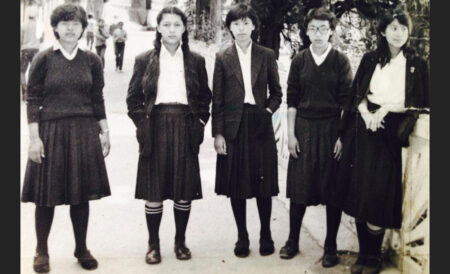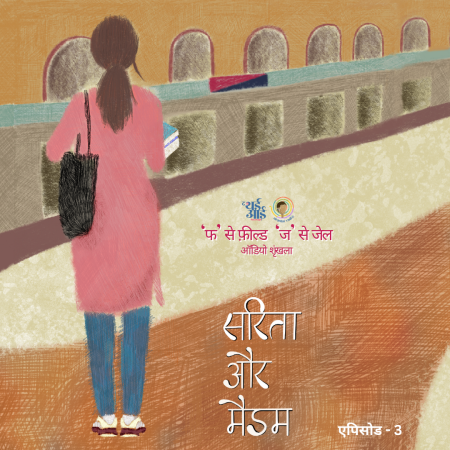One
“I put the PRO in Procrastinate”, read a t-shirt that seems to have become quite popular on my campus over the last few weeks as the students headed into their final exams. It does not take a psychoanalyst to interpret students’ t-shirts on a college campus, sassy or not, to get a sense of what their world is made up of. I live and work on a predominantly undergraduate campus that worships good grades and favours the all-rounder student; a sportsperson who is a 9-pointer (local lingo for a straight-A student) while also a die-hard film buff is God. Owning up to the pressures that stare them in the face, the t-shirt is one instance of wearing one’s vulnerability on the sleeve, not unlike using self-deprecation to pre-empt external criticism.
Could this self-deprecation be a response to academia’s inherent ableism? Ableism is an idea that invites us to think about the structures we operate in and how those structures privilege able-bodiedness: normalised notions about bodies, minds, looks, social behaviour and relations, workplace deportment, romantic relations, cognitive and affective abilities, and the food we eat. Theoretically, ableism is described as a deep structure that values able-bodiedness, and if we could call it that, able-mindedness, something that is better known as sanism. Impacting everything that we know and do, ableism constitutes the building blocks of all our actions in our professional, public and private lives.
While it may not be surprising that students with disabilities have to overcome various barriers while navigating school and higher education systems in India, we must take that leap of faith that enables us to break down how systems we have come to accept, restrict everyone and are intrinsically ableist. Undertaking such an analysis may be provocative, but it may be instructive and generative in the long run.
It could begin with a thought experiment.
What do you recall about writing exams in school? Having to sit up straight for several hours, writing with concentration? Not being able to rest your writing arm, even if it was cramping, for fear that you would run out of time? Having to recall everything that you had read and dreading that you would forget? And, on days when you had two exams, all of the above had to be doubled?
As a result, which of the following have you acquired? An unshakable fear of forgetting information? The anxiety of not being able to use the washroom because its only connotation is cheating or failure? A mastery of sitting up straight for hours at a stretch? Or, is it the fear of failing, now congealed into the mass of your body so indelibly that even when you are asked to unthink it, it remains a part of your physiology?
If you have chosen even one of the options for either question, you have known ableism.
Growing up, I learnt that it was a sin to be lazy. This was long before I knew that sloth was one of the seven deadly sins and long before I had read that things could be socially constructed. Laziness was me, and I was laziness; I had internalised ableism.
Two years ago, over three decades after that word was attached to me, I serendipitously found an article that discredited this label of laziness and dismantled the edifice that upheld procrastination as a vice. In jubilation, I posted it as my WhatsApp status. The student who had done an independent study on his peers’ mental health expressions on social media texted to say that he resonated with the article I had posted. Grateful for having read it, he said he had shared it with his parents so they would recognise that they were gaslighting him every time they called him lazy in disgust. In the semester of the independent study project, the student and I learnt about the problem of ableism. He read Mad at School, a 2011 book that describes the complex relations between mental health and academia by proposing the idea of “kairotic spaces” to understand the types of locations and moments that higher education produces, which different participants would perceive and react to differently. According to the author, Margaret Price,
Kairotic spaces are the less formal, often unnoticed, areas of academe where knowledge is produced, and power is exchanged. A classroom discussion is a kairotic space, as is an individual conference with one’s advisor. Conferences are rife with kairotic spaces, including the Q&A sessions after panels, impromptu elevator encounters with colleagues, and gatherings at restaurants and bars on the periphery of formal conference events. Other examples from students’ experiences might include peer-response workshops, study groups, or departmental parties or gatherings to which they are invited. (Defining Kairotic Space).
My student’s research that semester kept leading us to the wall of merit that these kairotic spaces seemed to constitute continually and variously.
Scrolling through students’ social media posts on our campus, we were trying to check the pulse of the mental health talk that students engaged in, either explicitly or through memes, jokes and songs. He found that mid-semester and final exam times were stressful; students created memes and posted messages about feeling lonely and depressed. In a few rare instances, there was talk about wanting to end their life. They attributed all this to not being successful in academics and/or love and/or the extracurricular activity clubs.
Important things have been written about the casteist nature of merit, and it is time to reflect and observe the ableist contours of merit.
That merit is not accessible to persons with disabilities is not merely the point; what is under-examined is how merit is made up of ableist structures. What is always intriguing, which is not unfamiliar in the case of caste, is that merit is first set up as a democratically achievable objective; merit’s operation is celebrated as intrinsically democratic, and anyone can be meritorious. Unpacking this has revealed that the privilege of access to capital and, in turn, certain kinds of schooling and higher education, directly enables better chances of possessing merit.
Furthermore, one is meritorious when their capacity to be able-bodied and able-minded is fulfilled.
When the idea of merit’s democracy is made in the context of disability, there is an inherent assumption that disability is physical and that merit is intellectual, so if one is disabled physically, one can still be meritorious.
I want to reflect that in all its glory, merit is in fact constituted by a quick compounding of physical and affective abilities that is rendered invisible because it is short-circuited to only mean intellectual calibre. It is about sitting for several hours writing and being unable to go to the washroom. It is about being able to recall everything that one has read without being distracted, for instance, by the emotional drama happening at home and/or the romance that is falling apart and/or the fear of failing an exam and not being placed in a lucrative job via the campus interview. Merit is an enactment of ableism.
Stealthily, any discussions of school and college education assume able-bodied and able-minded individuals as the only constituency worthy of teaching.
Today, there are discussions about students’ mental health at all levels, thanks to the public debate on suicides. The idea of depression or anxiety as a trigger of suicide is considered an acceptable explanation. It is in this context that Vijeta Kumar, a writer and professor at St. Joseph’s University, Bengaluru, discusses the costs of claiming depression as part of one’s identity while also being Dalit because of the compulsory able-bodiedness expected of every Dalit. What kind of mental health problems can students have? What kinds of mental health problems are acceptable? Ones caused by bullying in school and stress triggered by academic schedules are more readily embraced than ones driven by casteist bullying or academic expectations of merit. The first kind can be individuated; you can be told you’re too sensitive or that you take offence quickly and sent for counselling, something that will make you emotionally stronger. In so doing, the second set of instances slips into the mandated oblivion, obscured because of the white lies we must necessarily believe—there is no such thing as casteism, and we must be meritorious to lead a successful life, the only kind we want.
Two
I want to move on to a set of stories about disability accommodations that expose other dimensions of ableism. Long before Audible became fashionable and revolutionised “reading”, talking books were one of the formats in which books were accessible to blind people. Turning text into speech is an accommodation that enables diverse “readers”. Reasonable accommodation in international and Indian disability laws entitles various adaptations to students with different access needs. Accommodations address barriers created by a wide variety of norms and practices of standardisation. The United Nations Convention on the Rights of Persons with Disabilities (UNCRPD) does not describe the kinds of accommodations that can be made but this has strengthened its underlying goal of non-discrimination by supporting different accommodation claims. Access needs of persons with disabilities vary across impairments. Additionally, people with the same impairment may have different access needs based on gender, caste, class, region and religion.
Consider that providing a scribe and a laptop with speech-to-text software-enabled are both accommodations for someone with a visual impairment. So also, a writer may be provided for someone with a learning disability, someone with a visual impairment and someone with upper limb impairment. Accommodation is based on the experience of disability and not only the assumed impairment effect; I do not have to prove that I have a bodily or cognitive impairment, for instance, but demonstrate that there are barriers that prevent me from doing my job correctly.
We have a long history of informal measures adopted in educational and employment establishments such as teachers or classmates and co-workers who provide support out-of-kindness, or the-goodness-of-their-heart, where the student with a disability becomes forever indebted to this individual. We also have a long history of the establishment not recognising disability support as its responsibility. A school instituted awards for students who supported their classmates with disabilities, thereby individuating the support mechanism while not facilitating structural support such as a formal office of disability services. In both these cases, disability depends on human goodness and is used as a platform on which the moral or charitable nature of the support provider is staged and rewarded.
Embedding the reasonable accommodation clause in law is, therefore a formalised corrective that follows this twin history.
According to Amita Dhanda, Professor Emerita at the NALSAR University of Law, the reasonable accommodation clause is grounded in the principle of inclusion and addresses the exclusionary potential of norms that do not account for the experiences of persons with disabilities. To quote Dhanda, “If non-implementation of an accommodation could prevent a person with disability to partake of the right, then irrespective of cost, reasonable accommodation as an integral limb of the right to equality has to be provided. If, on the other hand, non-acceptance of the accommodation does not have such consequences, then it would be reasonable to refuse accommodation.” (Reasonable Accommodation for All).
For decades, Congenital Colour Vision Deficiency (CCVD) was used to disqualify students from opting for certain specialisations in medical education in India. However, it was found that CCVD cannot be standardised as its lived experiences vary widely. Additionally, the test may not determine how an individual with this condition may experience it in real life. This cannot disqualify a person from pursuing a field of specialisation in medicine. Different people experience this condition differently, and having different kinds of support within the teaching-learning space could enable a student to pursue their branch of specialisation. Upreet Dhaliwal, a Health Humanities practitioner, has argued that the spirit of reasonable accommodation can enable students to develop their systems of colour recognition. In 2017, a Supreme Court bench directed the Medical Council of India to admit students with CCVD to MBBS courses while insisting that guidelines be developed to test their level of deficiency and stipulate which specialisations could be opted for with which levels of deficiency. CCVD is not recognised as a disability as per the Rights of Persons with Disabilities (RPWD) Act 2016. However, it offers a case where Dhanda’s notion of “reasonable accommodation for all” can be tested and implemented to support the services of medical doctors with CCVD.
While reading about court cases centred on reasonable accommodation, I learned that many students requiring such accommodation in higher education contexts in India are denied it, not because their educational institution cannot afford it financially but because the thought of supported exam-taking or giving cannot be afforded due to a limited imagination of what constitutes merit. In 2021, when a civil services candidate required a scribe due to Writer’s Cramp, a task-specific movement disorder, the Union Public Service Commission (UPSC), the exam-conducting body, argued that such an accommodation was only prescribed for visually impaired students with medically proven 40 per cent disability. What was the perceived risk in the Vikash Kumar case? By being sighted, the student with Writer’s Cramp may take advantage of the intellect of the scribe assigned to them. This fear of the abuse of the scribe doesn’t seem to have cropped up in the case of visually impaired students. Being unsighted is an entitlement for support because the world, it could be argued, is not only culturally but also ideologically ocular-centric, which ranks visual perception over any other sensory perception.
A student with visual impairment is readily identified as worthy of support, perhaps because of an unwillingness to recognise that the world can be accessed with more than just sight.
Conversely, it may not be farfetched to infer that it is this limited imagination that enables the domination of ideological ocularcentrism. What seems to have come under suspicion here is that the examinee’s sightedness will not prevent them from establishing a kind of communication with the scribe that would unduly benefit them in an exam. So also, being unsighted reduces one’s capacity to take advantage of the scribe? A layered reading of this case thus reveals that the fear of providing a scribe to a sighted student may have had more to do with the conflation of sightedness and “merit” than meets the eye.
Without opening up speculation on the ways in which distinct impairments carry distinct value and meaning in academia, it would not be inappropriate to observe that, in this instance, the provision of accommodations threatened to tear the carefully woven gossamer of merit. Merit, it appears, is presumed to be the pure manifestation of intellectual capabilities (as if this could unmistakably be identified as a distinguishable human faculty). The foregrounding of this idea obscures the reality that intellectual competence is and can be measured only in terms of able-bodiedness—being sighted, the faculty of memory, oral-aural interaction, the physical capacity to sit for hours in a particular position, attention span and other affiliate capacities.
Again, Specific Learning Disabilities (SpLDs) is a category of disability included in the RPWD Act 2016. SpLDs include executive function disorder, dyslexia, and perceptual disabilities, among others. In 2018, when the Medical Council of India (MCI) set out its guidelines for admitting students with disabilities into medical colleges, those with SpLDs were considered ineligible. This was based on the conclusions of a psychiatrist who served as an expert to guide the MCI on admission procedures of candidates with disabilities.
Dr. Satendra Singh, a Medical Humanities scholar and an advocate of disabled doctors’ rights, has rightly criticised the MCI’s dependence on a psychiatrist to advise them on learning disabilities, implying that learned academic bodies in India do not care to become aware of disabilities and are quick to medicalise people with disabilities when they are required to draft a policy determining their professional inclusion. Psychiatrists are not the appropriate professionals to determine learning disabilities, at least not in the absence of the more appropriate professionals that would include paediatricians, psychologists and special educators! The decision was based on the claim that no objective criteria or methods were established to quantify cognitive status or mental illnesses. Given this, the expert argued, there was a higher chance of parents of young adults trying to get fake certificates. The psychiatrist who pronounced that persons with learning disabilities did not qualify as candidates for medical education expressed apprehension that the rising number of students classified as having learning disabilities at the high school-level in a few states was indicative of a misuse of the diagnostic category to succeed in competitive school-leaving exams.
That the fear of misuse jealously guards every opportunity in which a reasonable accommodation claim could be fulfilled is remarkable. Time and again, it becomes apparent that accommodations are conflated or misconstrued as sympathetic dole-outs.
At the heart of this matter is the troubling public imagination of persons with disabilities needing to depend on benevolence and charitable actions.
When they demand reasonable accommodations as rights, they abdicate the role assigned to them by an ableist imagination which is also the one in power. Perhaps this inherent conceptualisation of disability-in-charity results in situations where establishments in charge of safeguarding and enabling persons with disabilities as rights-bearers are overcome by speculation about the truth claims about disability. These responses constitute another aspect of academic ableism in India.
Denying reasonable accommodation is inextricably linked to how merit is constituted within the Indian education system. Just as disability is not readily recognised as a type of difference that one lives with, so also propositions implicit in disability law are consistently invisibilised. Reasonable accommodation, if adopted at all levels of education in India, would necessitate that we recognise diverse learning methods and styles, appreciate neurodiversity and continually not benchmark academic expectations. Embracing the provision of reasonable accommodations without hesitation, prejudice or suspicion would require that we build an Audible around neurodiversity and not relegate it to sassy t-shirts alone.
I thank Aditya Ramaswamy for essential conversations, Dr Bindhulakshmi Pattadath at TISS Mumbai, and Dr Meghana Rao at Azim Premji University for their feminist scholarship, and critical reflections on merit, reasonable accommodations and ableism in academic spaces.





